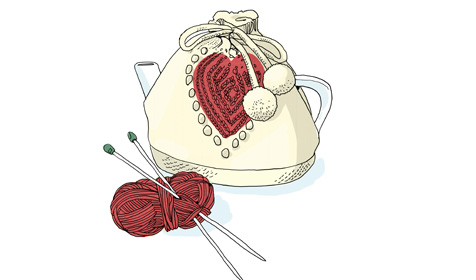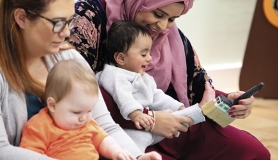Each year Wool Week is launched with a traffic stopping stunt. In 2010 London’s iconic Saville Row was transformed into a grazing pasture for real sheep. This year, the famous Harvey Nichols shop in London will get a woolly makeover to kick off the celebrations – all will be revealed on October 15th! Look out for Wool Week activities including stunts, fashion shows, design competitions, and exhibitions – all dedicated to the wonder of wool.
WHAT BETTER TIME TO GET KNITTING?!
As the nights draw in and we’re in the midst of Wool Week, this is the perfect time of year to take up knitting. There is no better way to gather round the fire, with friends, family or alone, than with a pile of crafting materials. Something about the repetitive motions of knitting makes it very meditative and relaxing, and to have something to wear, use, or give as a gift as the end product adds up to a very fulfilling activity.
If you are just starting out knitting and want an easy, quick but satisfying project to get stuck in to, the sweet little elephant pattern (see bottom of the page) is all knitted in one piece (except for the ears). You can find excellent tutorial videos on knitting stitches on Youtube. The elephant can then be stitched up and stuffed and makes a lovely little toy for a baby or child. You can embellish with eyes etc. as you want to, but remember if making it for a baby, avoid detachable buttons/beads for eyes and simply embroider with black wool. Experiment with making a herd of elephants in different wools!
OUR PICK OF THE BEST ETHICAL YARN SUPPLIERS
Seeking the loveliest, softest and most ethical yarns for your knitting projects? We’ve rounded up a few favourites.
The New Lanark Organic Wool Spinners
New Lanark Organic Wool Spinners offers an excellent range of natural organic knitting yarns. Produced from 100% organic wool from the Falkland Isles, their specialist organic wool spinning production unit was proud to be the first in Scotland to achieve the Soil Association’s organic certification. The Soil Association symbol provides a guarantee to the consumer that the textiles are produced to the highest standards of animal welfare and environmental protection.
New Lanark yarn is produced using traditional methods in one of the historic mills, where a 19th century spinning mule is still working, and is powered by renewable energy from their own hydro-electricity production.
The Nude Ewe
You can’t get much more ethical than the award-winning Nude Ewe non-profit wool company. Nude Ewe wool comes from sheep used in nature conservation projects in Bedfordshire and the surrounding counties. Grazing with heritage breed sheep mimics the traditional farming practices which created our grassland habitats and pastoral landscape. Unfortunately these sheep are not very profitable in today’s economy and many conservation graziers lose money. By giving sales proceeds back to the flock owners, the Nude Ewe is helping them to keep our countryside beautiful.
All their wool is undyed and unbleached, reflecting the many colours of Britain’s native sheep breeds. Each produces a distinctive wool, from the hardy, water-repellent near black Hebridean to the soft, lustrous cream-coloured Wensleydale. They also offer a series of ‘knit kits’ featuring designs created especially for the Nude Ewe. Kits include wool, a pattern and – when available – ‘pre-loved’ knitting needles.
The Wool Clip, Caldbeck, Cumbria
The Wool Clip began as a co-operative of Cumbria-based crafts people back in 2001. These folk were all enthusiastic designers and makers, but were juggling work with farming, families and other commitments. They also understood the threat to British wool and local sheep farming and the loss of traditional craft skills. By creating a co-operative, they were able to raise the profile of their work and create a shop that they could share – each member spends a couple of days per month in the shop and the commission from sales pays for the upkeep. You can buy gorgeous Cumbrian yarns or treat yourself to some of the beautiful home-made gifts on offer.
The members also organise the fantastic annual Woolfest in Cockermouth, Cumbria, which started in 2005 and now attracts over 100 stallholders and 4000 visitors each year.
Bessie May
Bessie May is a hand knit design studio providing Bessie May hand knit yarns and knitting and crochet pattern designs. Their passion for knitting and crocheting is evident from their website, and there is lots of inspiration for making beautiful items.
All Bessie May hand knit yarns are designed in-house, for their own knitting pattern designs, and are spun in selected mills in the mountains of Italy. Their beautiful, soft wools come in lots of lovely natural colours. I especially like their organic wool and nettle double knit yarn which, despite my (uneducated) expectations of nettle fibre, knits the most luxuriously soft and warm garments!
The Toft Alpaca Shop
Toft Alpacas is a prize-winning alpaca herd established in 1997 and based in the hamlet of Toft in North East Warwickshire. From the beginning, The Toft Alpaca Shop has been dedicated to British eco-conscious processing. All of their yarn and products are ecologically and ethically sound, made of 100% natural British alpaca and undergoing minimum contact with chemical processing. Their hand knitted collection is powered by a team of wonderful knitters, working from home across Warwickshire, Northamptonshire and Oxfordshire.
Toft is dedicated to getting as many people knitting as possible through an extensive knitting workshop programme and a full range of online knitting help. There’s also the chance to meet the alpacas with introductory days, family fun days and fibre workshops.
Baa Ram Ewe
Baa ram ewe is now 3 years old and is based in a redeveloped cow shed in the Headingley area of Leeds, West Yorkshire. Inside you’ll find some of the UK’s most luxurious fibres, along with wool from rare breed sheep and beautiful yarns from Yorkshire artisans. The shop is proud to showcase the many Yorkshire brands that are still thriving, from Rowan in Holmfirth, Cygnet in Bradford, King Cole in Keighley and Sirdar in Wakefield. Baa ram ewe is living the dream that founder Verity Britton had when creating her vision, embracing its philosophy to be more than just a wool shop. It’s an active, varied community, committed to putting Yorkshire back on the wool map, as well as encouraging the use of British Wool.
SOME OF OUR FAVOURITE BRITISH WOOL PRODUCTS
1). GORGEOUS WELSH BLANKETS
Jane Beck Welsh blankets
Jane Beck’s passion is vintage and antique textiles made in Wales. Her interest lies in the social history of the milling industry and preserving this information for future generations. She spends many happy hours tracking down blankets, shawls and quilts from all over Wales. She also has a unique network of friends in the industry, including those who run the handful of mills in Wales still producing cloth using age old looms and traditional methods. She is proud to only use Welsh producers, including a little army of seamstresses, conservators and knitters, who create hand made accessories, hand tailored clothing from Welsh tweed and pure wool knitwear. These are all modelled by her lovely daughters Ceinwen and Angharad. She stresses that visitors are warmly welcomed for a full on Welsh textile experience but please phone first so she can put the kettle on!
2). DELECTABLE DEVON DUVETS
Husband and wife team Dick and Pauline Beijen bought their flocks of sheep during the summer of 2008 as the first step into their idea of creating high quality, all natural woollen duvets. Devon Duvets now produce a range of high quality British Woollen duvets, pillows and mattress toppers. Not only are their products made in Britain with British wool, the wool is processed locally and packaging and labelling is produced in Devon, supporting the local economy and environment. All Devon Duvets products are handcrafted by professional seamstresses, using British Certified Platinum ‘A’ grade wool and soft cotton. The wool is not bleached or chemically treated and they are committed to sustainability and having a carbon footprint that is as small as possible.
3). COMFY CUSHIONS AT ENGLISH ECCENTRIC
Sarah Baulch leads English Eccentric, and is motivated to pursue great design combined with positive ethical outcomes. Mixed in with these admirable goals is her own mischievous sense of style. All her knitted goodies are made with organic wool, sourced from the UK. The Jacobs sheep that the fleeces come from have a very nice life, overlooking the waters at Bosham Harbour in West Sussex and munching unfertilized grass. Up until the 18th century all wool was dyed using natural pigments derived from plants and animals but nearly all wool now is coloured with man-made chemical dyes. English Eccentric wool is dyed without the use of chemicals. The organic wool they use is special and unique – allergy free, sourced on their doorstop, processed in the UK and knitted up by talented ladies in and around Chichester. Check out their Bunny Slippers, Knitted Union Jack cushions and Bunting in the Mad Hatter range and support this cottage industry.
4). SNUG SWEATERS AT SWALEDALE WOOLLENS
In one of the most beautiful areas of Northern England the tradition of hand knitting in local wool goes back over 400 years to the days of Queen Elizabeth I. It was Elizabeth who set a new fashion by wearing hand knitted stockings and, with demand increasing, every family in Swaledale – men, women and children – became involved in knitting woollen stockings. In the early 1970’s the people of Swaledale revived the art of hand-knitting and Swaledale Woollens cottage shop was opened. Today there are over 30 people knitting from their homes and producing a unique range of quality woollen knitwear. The wool provided for the knitters is mainly from Swaledale sheep, but they also use the different shades and textures provided by the nearby Wensleydale breed and Welsh hill sheep. The wool is organically spun and finished at the environmentally friendly Lanark Mill in Scotland, which uses renewable energy to power the mill and its 19th century spinning mule. Real horn buttons are used on many of the garments.
5). QUIRKY TEDDIES AT BORDER BEARS
Graig-fach Farm is a small grassland farm in the foothills of the Black Mountains in south-east Wales. It is the home to a flock of coloured sheep kept especially for their fine fleeces which are sold to handspinners, weavers and felters. Corriedale fleece provides an excellent felting wool whilst Ryeland wool makes a perfect filling material because of its springiness. Jeanine Blok hand makes all of her quirky and unique Border Bears, using upcycled materials. This way, the materials are not only given a second life, but they give each bear a carefully crafted identity because of the past they carry with them.
Kaz’s Easy Elephant Knitting Pattern
Use double knit (dk) yarn and 4mm needles
For a larger elephant, use Aran or chunky wool and larger needles
You will need: 25g dk yarn in colour of your choice, 25g wool fleece or stuffing
Body
Cast on (C/O) 30 stitches (sts)
Row 1-8: Knit each row
Row 9&10: Cast off 4 sts at the beginning of each row (leaving 22 sts)
Row 11-20: Knit each row
Row 21&22: C/O 4 sts at the beginning of each row (30sts)
Row 23-30: Knit each row
Row 31&32:Cast off 8sts at the beginning of each row (14sts)
Row 33-35: Knit each row
Row 36&37: Cast on 8 sts at the beginning of each row
Row 38&39: Knit each row
Cast off
Ears (make two)
Cast on 4 sts
Knit one row
Make one stitch at the beginning of each row (until 10 sts)
Knit 4 rows
Cast off
To make up
Sew each foot seam and leg seam x 4
Fold body in half, sew trunk seam, head and undercarriage
Leave gap at rear. Stuff trunk lightly, stuff legs firmly. Make ball of stuffing for head and a flat sausage for body
Sew running stitch around rear and pull tightly and finish off
Make a plait/crochet chain for the tail and secure in place






